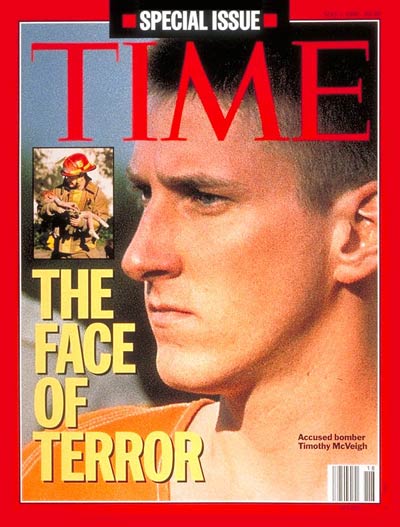
When a truck bomb blasted through a federal office building in Oklahoma City on a Wednesday morning 20 years ago — April 19, 1995 — it was the deadliest terrorist attack in the history of the nation to that point.
Though fingers pointed many directions in the immediate aftermath, it didn’t take long for investigators to find Timothy McVeigh. As TIME reported in a special issue devoted to the crime — with McVeigh’s face on the cover, alongside the words “The Face of Terror” — only a little more than an hour had passed since the bombing when he was pulled over for a traffic stop and arrested for driving without tags and insurance, and for carrying a concealed weapon. Two days later, the rogue driver was determined to be the same man who was suspected of masterminding the attack.
McVeigh and his accomplices’ possible link to antigovernment organizations immediately drew additional scrutiny to the subject, and offered some insight into the twisted mind that planned such a crime—and why it happened when it did:
Although the Michigan Militia, along with members of other groups, has moved quickly to repudiate any connection with McVeigh or the bombing, the significance of the date on which it took place–April 19–was not lost on those familiar with the patriot movement. Says Ron Cole, a former leader of the Branch Davidian sect who describes himself as a patriot: “It’s a date that has a significance like no other day of the year.” On April 19, 1775, the Battle of Lexington–the opening salvos in America’s Revolutionary War–began. On April 19, 1993, the siege at Waco ended in flames and despair. On April 19, 1995, Richard Wayne Snell, a member of the white supremacist group The Covenant, the Sword and the Arm of the Lord, was executed for the murder of a Jewish businessman and a black police officer. And when Timothy McVeigh rented the Ryder truck, he used a forged South Dakota driver’s license on which the date of issue was listed as April 19, 1993. “He probably meant that he woke up on that day,” says Cole. “I can see his perspective on that.”
In the years since, Oklahoma City has tried to make that date stand for something very different: rather than an example of separatism, they’ve made April 19 a date to remember a community coming together to help one another, living by the idea they call the “Oklahoma Standard.”
Read more from TIME’s special 1995 issue about the bombing, here in the TIME Vault: A Blow to the Heart
More Must-Reads From TIME
- The 100 Most Influential People of 2024
- Coco Gauff Is Playing for Herself Now
- Scenes From Pro-Palestinian Encampments Across U.S. Universities
- 6 Compliments That Land Every Time
- If You're Dating Right Now , You're Brave: Column
- The AI That Could Heal a Divided Internet
- Fallout Is a Brilliant Model for the Future of Video Game Adaptations
- Want Weekly Recs on What to Watch, Read, and More? Sign Up for Worth Your Time
Write to Lily Rothman at lily.rothman@time.com